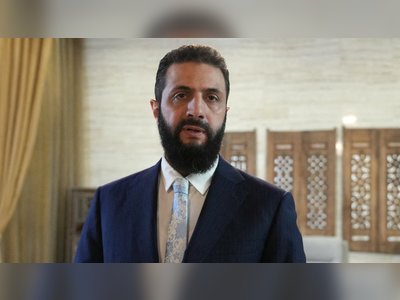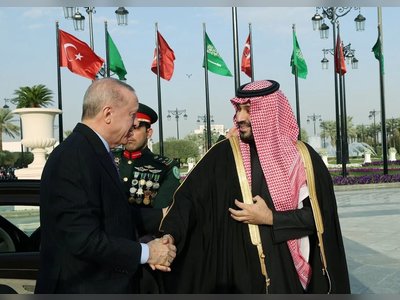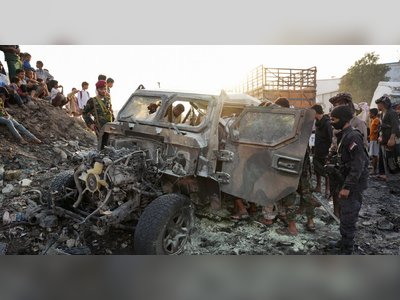
International Outrage Over Trump’s Proposal for Gaza
Leaders from Jordan and Egypt express fierce opposition to the US President's controversial plan to displace Palestinians and assume control of the Gaza Strip.
Donald Trump's recent proposal to have the United States "take ownership" of the Gaza Strip has ignited a wave of international condemnation.
The plan suggests that over two million Palestinians would need to be displaced to turn the region from what Trump called a "demolition site" into a new "Riviera of the Middle East."
This proposal was discussed during a joint press conference with Israeli Prime Minister Benjamin Netanyahu, where Trump stated that Israel would turn Gaza over to the US after concluding military operations against Hamas.
He asserted that the displaced Palestinians would be resettled in "safer and more beautiful communities" elsewhere in the region.
Jordan and Egypt, which border Gaza, have been particularly vocal against the idea.
Jordan's King Abdullah II and Egypt's President Abdel Fattah al-Sisi are reportedly set to meet with Trump in Washington to argue against the plan.
Leaders from both countries have expressed serious concerns about having to accommodate large numbers of displaced Palestinians permanently.
The implications of such a displacement echo historical events, particularly in Jordan where a significant portion of the population has Palestinian roots.
More than half of Jordan's current residents are believed to be of Palestinian origin, many of whom are classified as refugees.
Samuel Quilliam, an associate fellow of Chatham House, highlighted the fears among Jordanian officials regarding the potential for an Israeli policy of population transfer becoming a reality.
Jordanian officials have warned that forced displacement from Gaza could lead to increased hostilities and may provoke armed conflict, as is ingrained in the country's demographic sensitivities.
The government has faced domestic pressure to advocate for Palestinian rights, and compliance with Trump's proposals could be perceived as a betrayal.
In Egypt, the situation is similarly precarious.
The Egyptian government has denied entry to Palestinians fleeing violence in Gaza during the ongoing conflict, citing fears of a destabilizing influx of refugees.
Recent analysis by regional experts outlines the potential for increased militancy and civil unrest in both countries should Trump's plan proceed.
International responses include condemnation from various global leaders and organizations.
The United Nations Secretary-General António Guterres has warned against any actions resembling ethnic cleansing, emphasizing the need to respect international law.
The UN and multiple human rights organizations have denounced the idea of forcibly relocating Palestinians, calling it a violation of their rights.
Trump's assertion that this plan could enhance safety and provide new opportunities for Palestinians has been met with skepticism domestically and abroad.
Many Republican senators have voiced their opposition to deploying US troops to Gaza, reiterating concerns about the practicality and legality of such a proposal.
The backlash against Trump’s comments reflects broader apprehensions about US involvement in Middle Eastern conflicts.
His administration's lack of detailed operational plans and the absence of feasibility studies further complicate the legitimacy of the proposed actions.
Despite the pushback, Trump has signaled his commitment to seeing the plan through, stating that Jordan and Egypt would ultimately agree to the proposal.
The long-term consequences of this diplomatic disagreement could significantly alter US relations with key Middle Eastern allies, amidst growing tensions concerning the future of Gaza and Palestinian rights.
The plan suggests that over two million Palestinians would need to be displaced to turn the region from what Trump called a "demolition site" into a new "Riviera of the Middle East."
This proposal was discussed during a joint press conference with Israeli Prime Minister Benjamin Netanyahu, where Trump stated that Israel would turn Gaza over to the US after concluding military operations against Hamas.
He asserted that the displaced Palestinians would be resettled in "safer and more beautiful communities" elsewhere in the region.
Jordan and Egypt, which border Gaza, have been particularly vocal against the idea.
Jordan's King Abdullah II and Egypt's President Abdel Fattah al-Sisi are reportedly set to meet with Trump in Washington to argue against the plan.
Leaders from both countries have expressed serious concerns about having to accommodate large numbers of displaced Palestinians permanently.
The implications of such a displacement echo historical events, particularly in Jordan where a significant portion of the population has Palestinian roots.
More than half of Jordan's current residents are believed to be of Palestinian origin, many of whom are classified as refugees.
Samuel Quilliam, an associate fellow of Chatham House, highlighted the fears among Jordanian officials regarding the potential for an Israeli policy of population transfer becoming a reality.
Jordanian officials have warned that forced displacement from Gaza could lead to increased hostilities and may provoke armed conflict, as is ingrained in the country's demographic sensitivities.
The government has faced domestic pressure to advocate for Palestinian rights, and compliance with Trump's proposals could be perceived as a betrayal.
In Egypt, the situation is similarly precarious.
The Egyptian government has denied entry to Palestinians fleeing violence in Gaza during the ongoing conflict, citing fears of a destabilizing influx of refugees.
Recent analysis by regional experts outlines the potential for increased militancy and civil unrest in both countries should Trump's plan proceed.
International responses include condemnation from various global leaders and organizations.
The United Nations Secretary-General António Guterres has warned against any actions resembling ethnic cleansing, emphasizing the need to respect international law.
The UN and multiple human rights organizations have denounced the idea of forcibly relocating Palestinians, calling it a violation of their rights.
Trump's assertion that this plan could enhance safety and provide new opportunities for Palestinians has been met with skepticism domestically and abroad.
Many Republican senators have voiced their opposition to deploying US troops to Gaza, reiterating concerns about the practicality and legality of such a proposal.
The backlash against Trump’s comments reflects broader apprehensions about US involvement in Middle Eastern conflicts.
His administration's lack of detailed operational plans and the absence of feasibility studies further complicate the legitimacy of the proposed actions.
Despite the pushback, Trump has signaled his commitment to seeing the plan through, stating that Jordan and Egypt would ultimately agree to the proposal.
The long-term consequences of this diplomatic disagreement could significantly alter US relations with key Middle Eastern allies, amidst growing tensions concerning the future of Gaza and Palestinian rights.











